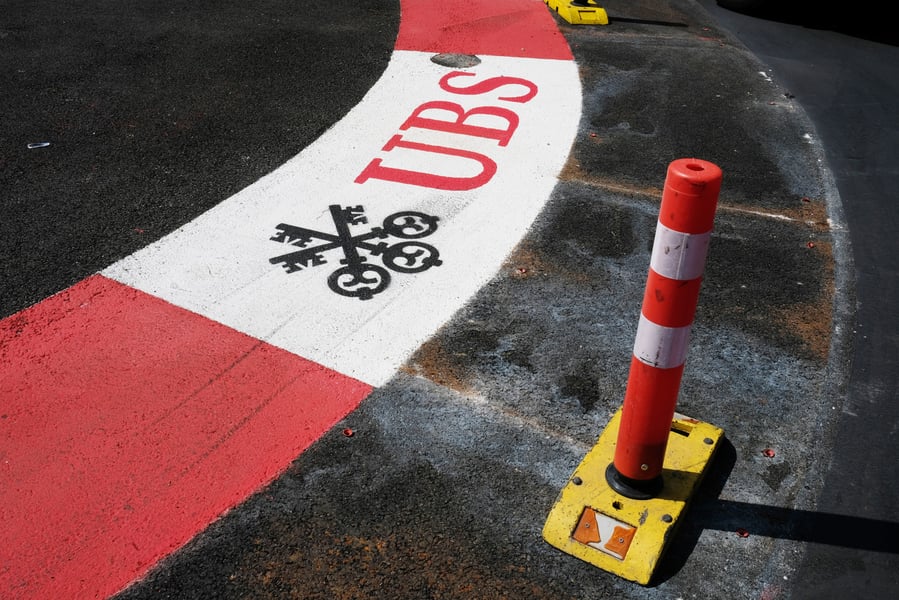It's UBS Group AG's $6 billion gamble, but the risk extends far.
The Swiss lender eschewed a settlement in a French tax investigation after failing to agree on an amount, exposing it to in-court demands from the state and prosecutors. Paris judges impose as much as 5.3 billion euros ($6 billion) in fines and damages for lost revenue.
The verdict comes Wednesday. While it's no secret that thousands of French citizens moved funds to undeclared Swiss accounts to avoid taxes, the court will have to decide whether there is evidence UBS provided services to conceal such fraudulent funds — and to what extent.
The danger for UBS and financial prosecutors, but also other companies under investigation in France, comes down to the bet on going to court or pushing for a deal.
(More:
UBS reaches last leg of two largest court battles)
Paris attorney Benjamin Grundler said multinationals will be monitoring the case, and tweaking their legal strategies depending on "where the court sets the bar."
"If UBS is convicted and gets an eye-watering fine, that's going to make firms currently under investigation increasingly more eager to seek settlements," Mr. Grundler said. "But if there's no conviction or if the fine is small, they'll wonder: Isn't it better to put up a fight despite the potential bad press and protracted process rather than paying 100-million or billion-euro fines?"
France two years ago introduced a U.S.-style settlement procedure, helping financial prosecutors take on a more global role. Societe Generale SA negotiated with the Parquet National Financier last year to pay 250 million euros to end a bribery case, and HSBC Holdings Plc similarly settled a tax probe in 2017 for 300 million euros — the largest criminal fine in France.
The two recent French settlements are still far less than the multi-billion-dollar fines issued by authorities in the U.S. or Brazil in cases involving BNP Paribas SA, JPMorgan Chase & Co. and construction firm Odebrecht SA., and still only half of what Siemens AG or Rolls-Royce Holdings paid in Germany or the U.K.
In the UBS case, prosecutors have requested that Paris judges impose a 3.7 billion-euro fine, while the French government is seeking another 1.6 billion euros in damages.
Ahead of the court's decision, UBS referred to a Nov. statement where the bank said "the lack of a case for the prosecution is very evident," and described the requested fine amount as "irrational." Regardless of the outcome, an appeal is expected.
(
More:
UBS saw decline in new client money in fourth quarter)
An acquittal would undercut some of the PNF's credibility because of the large fines it requested.
But a fine close to or breaking the French record would undoubtedly send "a strong signal," said Paris attorney Astrid Mignon Colombet, even if it's less than the 1.1 billion-euro bail UBS was forced to post before the start of the trial.
"France entered the settlement game only relatively recently and doesn't have a history of white-collar crime convictions with exceptionally high amounts," said Mignon Colombet, who isn't involved in the UBS case. "If there's a big fine on Wednesday, settlements are going to seem even more attractive to companies. And the already strong deterrent effect of court convictions will increase."
The Parquet National Financier was set up in 2014 after former French President Francois Hollande's budget minister Jerome Cahuzac, responsible for cracking down on fiscal fraud, had to resign because he used a secret Swiss account to avoid taxes. The PNF focuses on major white-collar crimes and is pursing investigations into Airbus SE, TechnipFMC Plc, billionaire Vincent Bollore and Google.
The financial prosecutor's office won its largest in-court conviction for a company in 2017 with a 80 million-euro fine for Rietumu Banka over accusations the Latvian bank participated in a tax-dodging scheme. Barely noticed elsewhere, it was a sea change in France where significant previous convictions rarely exceeded six-figure amounts.
But it was the HSBC deal and last year's Societe Generale settlement gave the PNF a role in the global fight against economic crimes. France took half of the total SocGen fine in a 50-50 split with the U.S., becoming one of the few jurisdictions that American authorities have worked with on bribery resolutions, including Brazil, the U.K. and Switzerland.
UBS has been dealing with the tax case for about eight years, and twice entered talks to settle. The first attempt broke down in 2014 after the Swiss lender balked at entering a guilty plea. Two years ago, UBS was angling to become the first company to use the settlement tool, paying fines but not admitting guilt, but discussions collapsed over how much the bank should pay and the case ended up in court instead. The PNF was seeking no less than the 1.1 billion-euro bail while UBS aimed to pay about six times less.
Mr. Grundler expects French financial prosecutors might become more greedy in settlement talks if they manage to clinch a convincing court win against UBS.
(More:
UBS buckles under uproar from brokers over non-solicit agreements)
"When you emerge as the victor in a battle like this that clearly strengthens your negotiating hand for other cases," said Mr. Grundler, who specializes in white-collar crimes but isn't involved in the UBS case.







